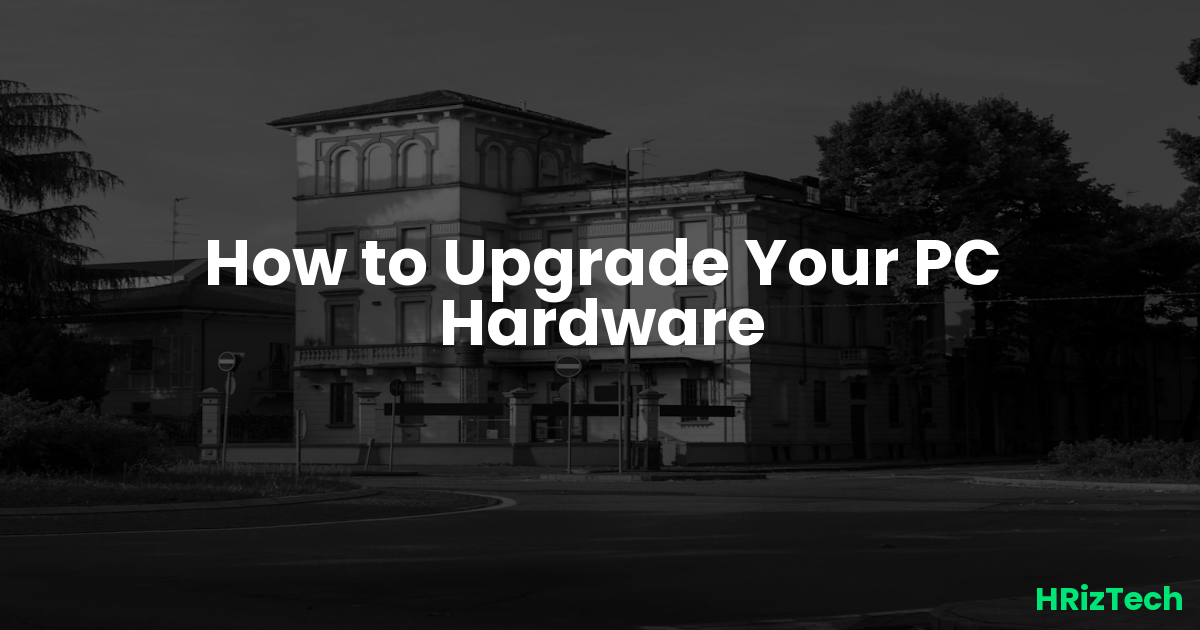How to Upgrade Your PC Hardware

How to Upgrade Your PC Hardware
Ever felt your computer slowing to a crawl? Frustrated with lag during gaming or endless loading screens? You're not alone! Many people experience performance issues that can be easily solved by upgrading their PC hardware. This guide will walk you through the process, making it simple and less intimidating than you might think.
Why Upgrading Your PC Hardware Matters
Upgrading your PC hardware isn't just about speed; it's about extending the life of your computer and improving your overall experience. A sluggish machine can impact productivity, enjoyment, and even your ability to run the latest software. By strategically upgrading components, you can breathe new life into your old system, saving you the cost of buying a completely new PC. Plus, with advancements in technology like improved machine learning capabilities in 2025, a more powerful machine allows you to harness these benefits fully.
Identifying Your Bottlenecks: What Needs Upgrading?
Analyzing Your System's Performance
Before you buy anything, diagnose the problem! Is it your hard drive struggling to keep up? Or is your graphics card choking under demanding games? Use tools like Task Manager (Windows) or Activity Monitor (macOS) to see which components are consistently maxed out. This will pinpoint what needs attention.
Common Culprits: RAM, Storage, and Graphics Card
RAM (Random Access Memory) is often a prime suspect for slowdowns. More RAM allows your computer to handle multiple tasks simultaneously. Storage (Hard Drive or SSD) speed greatly impacts boot times and application loading. A Solid State Drive (SSD) is a significant upgrade over a traditional hard drive. Finally, a weak graphics card can cause issues with gaming and video editing. If you regularly use graphics-intensive applications, this is a crucial upgrade.
Step-by-Step Guide to Upgrading Your PC Hardware
- Research and Select Components: Check online reviews and compare prices before buying anything. Consider your budget and the specific needs of your system. Make sure your chosen components are compatible with your motherboard and power supply.
- Back Up Your Data: This is crucial! Before you start disassembling anything, back up all your important files to an external hard drive or cloud storage. Data loss is a major headache you want to avoid.
- Gather Your Tools: You'll need a Phillips head screwdriver, possibly an anti-static wrist strap (to prevent damage to components), and potentially some thermal paste (if upgrading the CPU).
- Power Down and Disconnect: Completely shut down your computer and unplug it from the power outlet. Disconnect all cables and peripherals.
- Open the Case and Upgrade: Refer to your motherboard manual for specific instructions on opening your PC case and installing the new component(s). Take pictures as you go to help you remember how things were connected. Remember to ground yourself to prevent static electricity damage.
- Reassemble and Test: Carefully put everything back together, double-checking all connections. Reconnect your peripherals and power on your PC. Check if the new hardware is recognized by the system.
Common Mistakes to Avoid When Upgrading Your PC
Incompatible Parts: Always check compatibility before purchasing. Using incompatible components can lead to system failures. Improper Installation: Carefully follow instructions and watch online tutorials if needed. Incorrect installation can damage components. Ignoring Static Electricity: Static electricity can fry delicate components. Use an anti-static wrist strap to discharge static electricity.
Looking Ahead: PC Hardware in 2025
A 2025 Gartner report predicts continued advancements in AI and machine learning, demanding even more powerful PCs. Expect to see significant improvements in processor speeds, RAM capacity, and storage technologies. Cybersecurity threats will also be more sophisticated, making system security a top priority. Upgrading your hardware now ensures that your system can keep pace with these future needs.
How to Choose the Right PC Components for Your Needs
Choosing the right components depends on your budget and how you use your PC. If you're a gamer, you'll need a powerful graphics card. If you're a video editor, you'll need a fast processor and lots of RAM. If you're struggling with slow loading times, a new SSD could be the perfect solution. Consider browsing online forums and communities for advice tailored to your specific needs. Have you tried building a custom PC before?
For more help with coding, check our guide on Python basics and learn how to create a bot using AI tools for chatbot development. For more on machine learning, see our article on machine learning applications.
Upgrading your PC hardware can dramatically improve its performance and longevity. By following these steps and avoiding common pitfalls, you can breathe new life into your computer and enjoy a smoother, faster computing experience. What's your biggest hardware upgrade success story? Let us know in the comments below!
Comments
No comments yet. Be the first to comment!